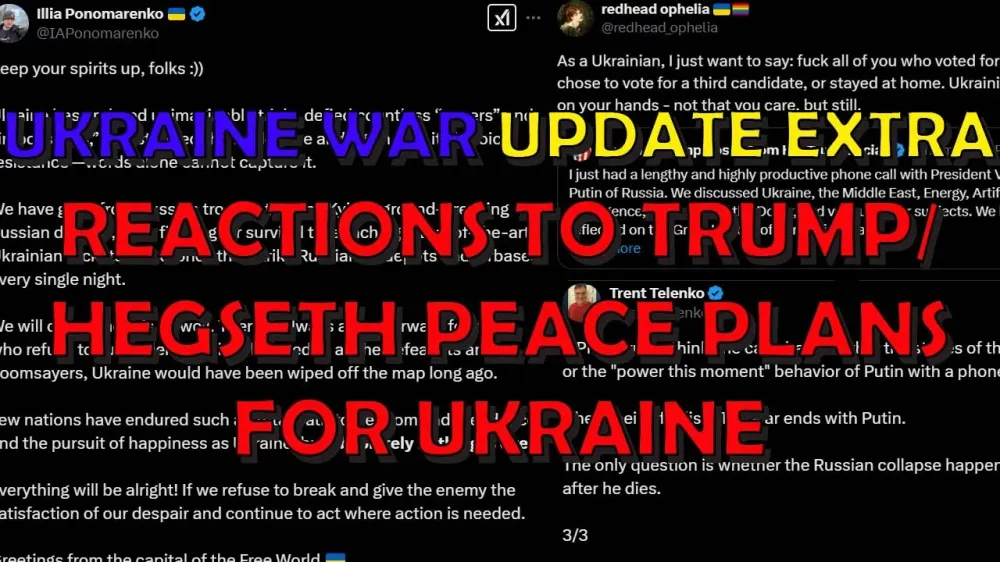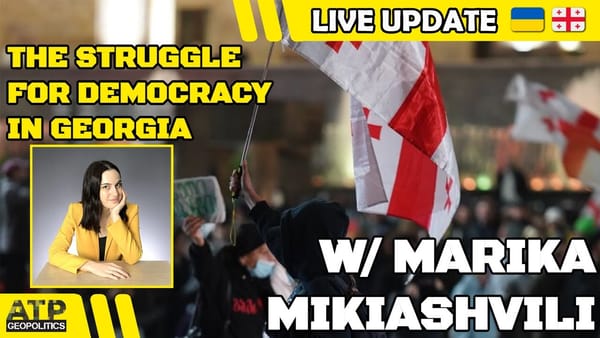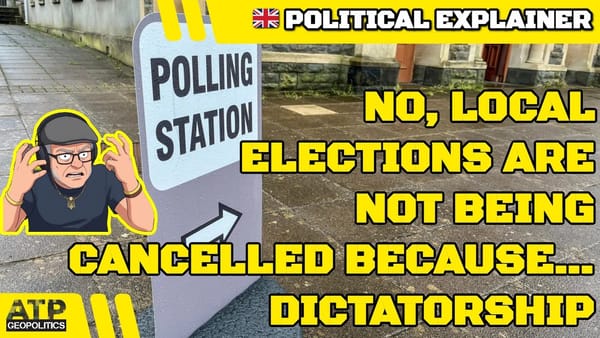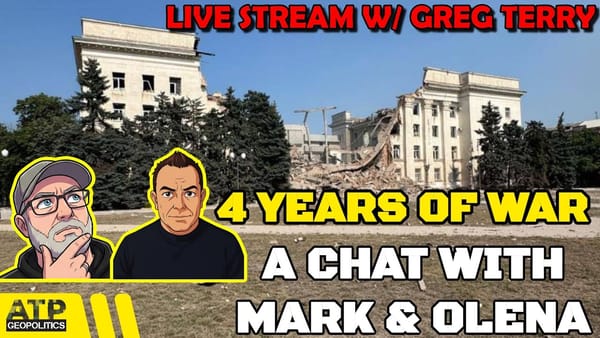Ukraine War Update EXTRA: Reactions to Trump/Hegseth on Peace Plans
Table of Contents 📖
"If President Trump thinks he can change either the stakes of the competence or the power, this moment, behavior of Putin with a phone call, he is being foolish. The war ends with Putin."
Hello Team
🎦 00:00-00:57⏩
Jonathan kicks off another ATP Geopolitics video, clarifying that this one isn't strictly breaking news but rather his reactions to the ongoing discussions about a potential peace plan for the Ukraine war, particularly those coming from Trump, Hegseth, and the American side. He highlights a significant potential disagreement brewing between the US and Ukraine, as well as its allies. Additionally, Jonathan mentions an upcoming live chat with Erlen from Tochny Nevy, focusing on German aid to Ukraine, where this topic will be discussed further. He acknowledges the volume of content and encourages viewers to be selective in their viewing, underlining that this particular video is dedicated to reactions, primarily from others, towards the statements made by Trump and Hegseth.
Return to top⤴️
Moscow Stock Exchange's Positive Reaction to Trump's Stance
🎦 00:57-01:27⏩
Jonathan begins by highlighting the Moscow Stock Exchange's reaction to Trump’s recent call with Putin, noting a significant positive surge. While he stops short of agreeing with claims that this indicates Trump saving the Kremlin from economic ruin, he acknowledges the clear indication that Russia is pleased with Trump’s recent pronouncements, ultimately benefiting them more than Ukraine.
Return to top⤴️
Ukrainian Voices: Dimko on the Failing Moral Leadership of the US
🎦 01:28-02:09⏩
Shifting focus to Ukrainian perspectives, Jonathan brings in the viewpoint of Dimko, a Ukrainian he recently interviewed. He notes a generally somber mood among Ukrainians, with Dimko calling for Europe to recognize the US's waning position as a moral and strong global leader. Jonathan emphasizes these are genuine concerns from Ukrainians about the shifting global landscape.
Return to top⤴️
Ukrainian Voices: Ilya Ponomarenko's Message of Resilience and Determination
🎦 02:09-03:39⏩
Jonathan then highlights a more optimistic perspective from Ukrainian journalist Ilya Ponomarenko. Ponomarenko’s message underscores Ukraine’s incredible resilience and their history of overcoming seemingly insurmountable challenges. He argues that had Ukraine adopted a policy of appeasement, they would have ceased to exist. Ponomarenko urges against despair, emphasizing that continued action and resistance are key. Jonathan reads Ponomarenko’s concluding line, "Greetings from the capital of the free world," underscoring the sentiment of potential betrayal by the US.
Return to top⤴️
Trent Talenko: Ukrainian Resistance to Unacceptable Peace Terms
🎦 03:39-05:56⏩
Jonathan introduces Trent Talenko, a logistics expert known for his pro-Republican stance. Talenko argues that Zelensky cannot surrender, nor will the Ukrainian people allow it. He refutes suggestions for negotiation, stating that Ukrainian and Russian positions are irreconcilable and that concessions would be unacceptable to either side. Jonathan highlights Talenko's assertion that the Russia-Ukraine war is existential for both nations, emphasizing the futility of appeasement. He points to Talenko’s conclusion that if Trump believes a mere phone call can sway Putin's resolve, he is mistaken, for the war will only end with Putin's demise.
Return to top⤴️
David Dey: Europe Must Stand Strong and Independent
🎦 05:56-07:56⏩
Jonathan moves on to David Dey, another prominent pro-Republican voice, who asserts that the US has no right to dictate the terms of peace for a war that ultimately belongs to Ukraine and Europe. Dey challenges Europe to stand strong, suggesting that if the US is unwilling to support a decisive victory, they should withdraw from European soil. Jonathan links this back to his previous discussions about US bases in Europe, arguing that such a withdrawal would ultimately harm the US more than Europe.
Return to top⤴️
Cognitive Dissonance and the Internal Conflict of Pro-Trump, Pro-Ukraine Individuals
🎦 07:56-09:11⏩
Jonathan delves into the concept of cognitive dissonance, explaining how conflicting beliefs, such as strong support for both Trump and Ukraine, can cause internal conflict. He discusses how individuals navigate this dissonance, with some acknowledging Trump’s negative stance on Ukraine while others struggle to reconcile these opposing views.
Return to top⤴️
Ukrainian Voices: Redhead Ophelia's Scathing Rebuke of Trump Voters
🎦 09:11-10:23⏩
Returning to Ukrainian perspectives, Jonathan shares a scathing comment from Redhead Ophelia, who directly blames those who voted for Trump, stating they have Ukrainian blood on their hands. While acknowledging this statement might offend some, Jonathan emphasizes the raw emotion and sentiment of betrayal felt by many Ukrainians.
Return to top⤴️
Ukrainian Voices: Max24's Pessimism and the Perception of a US Ultimatum
🎦 10:23-11:18⏩
Jonathan then brings in the perspective of Max24, a young Ukrainian commentator, who expresses a pessimistic view, perceiving the situation not as a trilateral negotiation but as a two-versus-one scenario where the US and Russia are dictating terms to Ukraine. Max24 believes the war will likely continue, lamenting the pessimistic mood in Ukraine and suggesting that the proposed ultimatums will not be accepted.
Return to top⤴️
Edward Hunter Christie: A Dark Day for America
🎦 11:18-11:42⏩
Further illustrating the critical response to Trump, Jonathan highlights Edward Hunter Christie's view that Trump's recent press conference was deeply concerning. Christie argues that Trump is pressuring Ukraine into accepting peace on Moscow's terms, signifying a dark day for America.
Return to top⤴️
Steve Rosenberg: Contrasting Biden and Trump on Putin
🎦 11:42-12:55⏩
Jonathan cites Steve Rosenberg, a BBC reporter based in Moscow, who draws a stark contrast between Biden’s and Trump’s approaches to Putin. While Biden openly condemns Putin as a dictator and thug, Trump expresses a desire for close collaboration, even suggesting future visits. Jonathan uses this contrast to challenge the notion of Trump as a shrewd negotiator, arguing that he appears to favor Putin over Zelensky.
Return to top⤴️
Trump's Appeasement, Not Negotiation: Favoring Putin over a Fair Outcome
🎦 12:55-13:29⏩
Jonathan further analyzes Trump's motivations, stating that Trump’s actions stem not from a desire for a fair negotiation but from a personal preference for Putin. He argues that Trump, seeking to emulate strongman leaders, is willing to appease Putin at the expense of Ukraine.
Return to top⤴️
The Russian Ultimatum as a US Peace Plan: Betraying Ukraine for Personal Gain
🎦 13:29-15:11⏩
Jonathan points out that Trump’s proposed peace plan mirrors Russia’s ultimatum, requiring Ukraine to cede territory and forgo NATO membership in exchange for the lifting of sanctions. He emphasizes that this is not clever negotiation but a direct adoption of Russia’s demands, further solidifying the perception of the US abandoning Ukraine.
Return to top⤴️
Christian Boros: Trump's Double Standard - Strength with Allies, Weakness with Putin
🎦 15:11-16:28⏩
Jonathan highlights Christian Boros’s observation of Trump’s contrasting approach to foreign policy. While adopting a hardline stance with allies like Canada and the EU, often resorting to tariffs and threats, Trump appears to capitulate to Putin, demonstrating a clear double standard.
Return to top⤴️
Dark Putin Satire: Highlighting the Absurdity of Trump's Concessions
🎦 16:28-17:14⏩
To further emphasize the widespread criticism of Trump’s stance, Jonathan cites a satirical tweet from the "Dark Putin" account, mockingly stating that the "art of the deal" apparently involves giving Putin everything he wants. Jonathan underscores that this satirical take reflects a common sentiment regarding the perceived one-sidedness of Trump’s proposed peace plan.
Return to top⤴️
Trump's Motivation: The Nobel Peace Prize - A Legacy Built on Appeasement
🎦 17:14-19:49⏩
Jonathan posits that Trump’s eagerness to secure a peace deal, even at the expense of Ukraine, is driven by his desire for a legacy and specifically, his longing for the Nobel Peace Prize. Jonathan argues that Trump’s actions are not about securing a fair or beneficial outcome for Ukraine but about achieving a personal victory, regardless of the cost.
Return to top⤴️
Kamala Harris and Hillary Clinton's Assessment: Trump's Susceptibility to Manipulation by Putin
🎦 19:49-21:41⏩
Jonathan shares past remarks from Kamala Harris and Hillary Clinton, both of whom have criticized Trump’s relationship with Putin. Harris states that dictators and autocrats see Trump as easily manipulated through flattery and favors, implying that Putin holds leverage over him. Clinton accuses Trump of being willing to enact Putin's agenda, such as dismantling NATO, further reinforcing the narrative of Trump's susceptibility to Putin’s influence.
Return to top⤴️
Jonathan's Conclusion: Trump's Acquiescence to Putin - A Pattern of Appeasing the Autocrat
🎦 21:41-22:08⏩
Jonathan concludes by reiterating his belief that Trump is more susceptible to manipulation than his predecessors, highlighting his tendency to appease Putin. He contrasts this with the clear-eyed approach of Biden, Harris, and Clinton, who have all used strong language to condemn Putin's actions.
Return to top⤴️
Call for Viewer Reactions: Understanding Global Perspectives
🎦 22:08-22:57⏩
Jonathan invites viewers to share their reactions and perspectives on the matter, particularly encouraging input from Ukrainians. He expresses his concern for their well-being and emphasizes the importance of understanding their dissatisfaction with the recent developments.
Return to top⤴️
Wrap Up
🎦 22:57-23:06⏩
Jonathan concludes by reiterating his invitation for viewers to share their thoughts in the comments and reminding them of his upcoming conversation with Erlin and potentially GAU. He signs off, expressing his well wishes to the viewers.
Return to top⤴️




